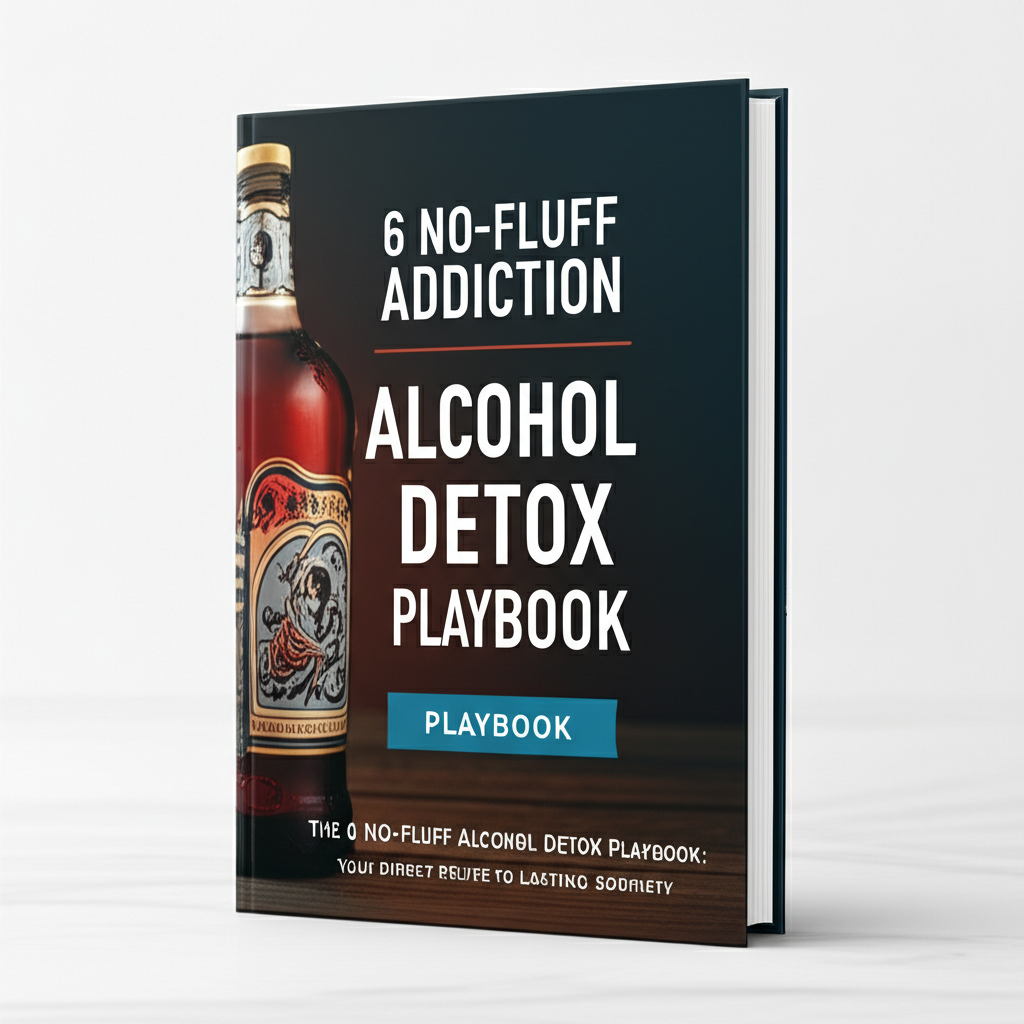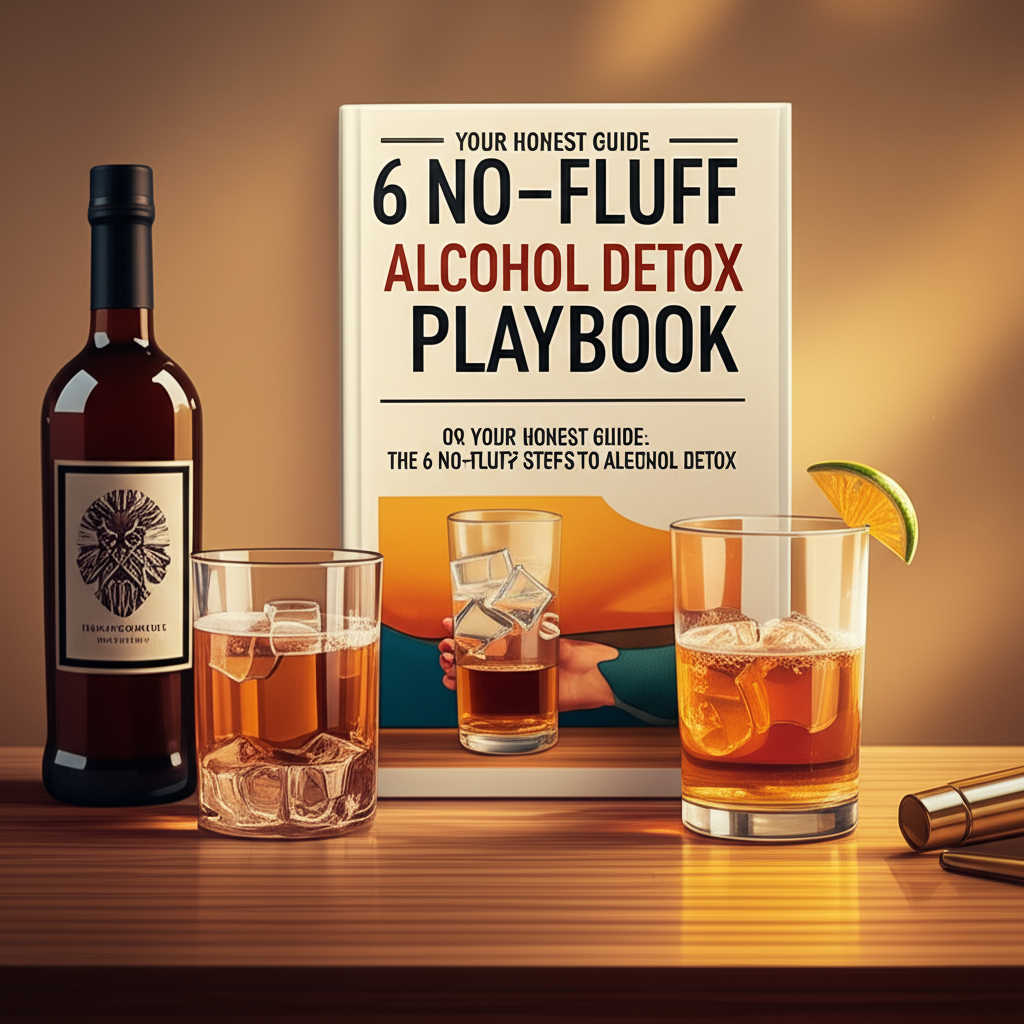The grip of alcohol addiction can feel like an inescapable labyrinth, a relentless cycle of craving, consumption, and regret. It whispers false promises of comfort while subtly, yet powerfully, dismantling lives, relationships, and health. If you’re reading this, chances are you or someone you love is standing at a crossroads, yearning for freedom but perhaps daunted by the path ahead – the path of alcohol detox and recovery.
Let’s be clear: escaping the clutches of alcohol is one of the most courageous battles one can undertake. It’s not merely about stopping drinking; it’s about healing, rebuilding, and rediscovering a life worth living, free from dependency. This isn’t a journey to be walked blindly. It requires a strategic, informed, and compassionate approach.
That’s why we’ve crafted the 4 Ultimate Addiction Alcohol Detox Playbook. This comprehensive guide breaks down the essential pillars of effective, sustainable alcohol recovery, moving beyond just the initial detox to encompass the holistic transformation required for lasting sobriety. Think of it not as a rigid set of rules, but as a dynamic strategy – a set of powerful tools designed to empower you at every step. Let’s dive in and unlock your path to a brighter, sober future.
Playbook 1: The Medical Safety Protocol – Navigating Detox with Professional Care
The first and arguably most critical step in overcoming alcohol addiction is a safe and medically supervised detox. Alcohol withdrawal can be dangerous, even life-threatening, making professional oversight non-negotiable for most individuals struggling with moderate to severe dependency. Attempting to quit "cold turkey" at home can lead to severe complications.
Why Professional Medical Supervision is Non-Negotiable
When alcohol is consumed regularly, the brain adapts to its presence, altering its chemical balance. When alcohol is suddenly removed, the brain struggles to re-regulate, leading to withdrawal symptoms. These symptoms aren’t just uncomfortable; they can range from mild anxiety and tremors to severe seizures and delirium tremens (DTs), a serious condition characterized by confusion, hallucinations, and rapid heart rate.
Key Reasons for Medical Supervision:
- Safety: Medical professionals can monitor vital signs, assess the severity of withdrawal, and intervene immediately if complications arise.
- Comfort: Medications can significantly alleviate the painful and distressing symptoms of withdrawal, making the process more manageable.
- Assessment: A thorough medical evaluation can identify underlying health issues exacerbated by alcohol or co-occurring mental health conditions that need integrated treatment.
Understanding Withdrawal Symptoms
The type and intensity of alcohol withdrawal symptoms depend on several factors, including the duration and amount of alcohol consumed, overall health, and prior detox experiences.
Common Alcohol Withdrawal Symptoms (Early Stage – 6-24 hours after last drink):
- Tremors (shaking hands)
- Anxiety and agitation
- Nausea and vomiting
- Headache
- Sweating
- Insomnia
- Increased heart rate and blood pressure
Severe Alcohol Withdrawal Symptoms (Later Stage – 24-72+ hours after last drink):
- Hallucinations (auditory, visual, tactile)
- Seizures
- Delirium Tremens (DTs): A medical emergency characterized by profound confusion, disorientation, severe agitation, and fever.
Medications in Detox: A Helping Hand
Medical detox facilities utilize specific medications to manage withdrawal symptoms, reduce cravings, and prevent dangerous complications. These are prescribed and administered under strict medical guidance.
Commonly Used Medications During Detox:
- Benzodiazepines (e.g., Ativan, Valium, Librium): These are the cornerstone of alcohol detox. They help calm the central nervous system, reducing anxiety, preventing seizures, and mitigating other severe withdrawal symptoms.
- Anticonvulsants: May be used in some cases to prevent seizures.
- Nutritional Supplements: Alcohol abuse depletes essential vitamins and minerals, especially B vitamins. Thiamine (Vitamin B1) is often given to prevent Wernicke-Korsakoff syndrome, a severe neurological disorder.
- Other Symptom-Specific Medications: For nausea, sleep disturbances, or blood pressure regulation.
The Detox Environment: Inpatient vs. Outpatient
The best detox environment depends on the individual’s needs, severity of addiction, and support system.
- Inpatient Detox: This involves staying at a specialized facility 24/7. It’s recommended for those with severe addiction, a history of complicated withdrawal, co-occurring mental health disorders, or a lack of stable home environment.
- Pros: Constant medical supervision, structured environment, removal from triggers, peer support.
- Cons: Can be more expensive, less flexible.
- Outpatient Detox: Suitable for individuals with mild to moderate addiction, a strong support system, and no history of severe withdrawal. Patients visit a clinic regularly for medication, monitoring, and counseling while living at home.
- Pros: Less disruptive to daily life, more affordable, maintains connection to family/work.
- Cons: Requires strong self-discipline, potential exposure to triggers, less intensive medical oversight.
Playbook 2: The Mental Fortitude & Emotional Resilience Strategy – Healing Beyond the Physical
While medical detox addresses the physical dependency, true and lasting sobriety demands a deeper dive into the psychological and emotional roots of addiction. This playbook focuses on equipping individuals with the mental tools and emotional resilience to navigate life without alcohol.
Beyond Physical Detox: Healing the Mind
Alcohol addiction is often a coping mechanism for underlying emotional pain, trauma, stress, or mental health issues. Simply removing alcohol without addressing these core issues leaves a void that can easily be filled again. Therapy is crucial for understanding the ‘why’ behind the drinking.
Cognitive Behavioral Therapy (CBT) & Dialectical Behavior Therapy (DBT)
These evidence-based therapies are highly effective in treating alcohol addiction.
- Cognitive Behavioral Therapy (CBT): Helps individuals identify and challenge negative thought patterns and behaviors that contribute to alcohol use. It teaches practical coping skills to manage triggers, cravings, and high-risk situations.
- Example: A person might learn to identify the thought "I’ve had a stressful day, I deserve a drink" and reframe it as "I’ve had a stressful day, I need to find a healthy way to de-stress like exercise or talking to a friend."
- Dialectical Behavior Therapy (DBT): A type of CBT that emphasizes emotional regulation, mindfulness, distress tolerance, and interpersonal effectiveness. It’s particularly useful for individuals who struggle with intense emotions or co-occurring personality disorders.
- Example: Learning mindfulness techniques to observe cravings without reacting to them, or practicing distress tolerance skills to ride out intense emotional waves without resorting to alcohol.
Group Therapy & Peer Support: The Power of Community
Isolation often fuels addiction. Group therapy and peer support networks provide a vital sense of community, understanding, and shared experience.
- Group Therapy: Led by a therapist, these sessions allow individuals to share experiences, receive feedback, and practice new coping skills in a supportive environment. It fosters empathy and reduces feelings of shame.
- Peer Support Groups (e.g., Alcoholics Anonymous (AA), SMART Recovery): These 12-step or science-based programs offer ongoing support from others who understand the struggle. They provide sponsorship, accountability, and a framework for sustained recovery.
- AA: Focuses on spiritual principles, admitting powerlessness over alcohol, and making amends.
- SMART Recovery: Emphasizes self-empowerment and uses cognitive behavioral and motivational tools.
Addressing Co-occurring Disorders (Dual Diagnosis)
It’s common for individuals with alcohol addiction to also have co-occurring mental health conditions such as depression, anxiety, PTSD, or bipolar disorder. This is known as a dual diagnosis.
- Integrated Treatment: For lasting recovery, both the addiction and the mental health disorder must be treated simultaneously and holistically. Treating only one often leads to relapse in the other.
- Therapeutic Approaches: This might involve specific medication management for mental health conditions alongside addiction therapy, ensuring a comprehensive approach to healing both aspects.
Playbook 3: The Holistic Wellness & Lifestyle Overhaul – Rebuilding Body and Spirit
Recovery isn’t just about stopping a harmful behavior; it’s about actively cultivating a healthier, more fulfilling life. This playbook focuses on practical steps to restore physical health, manage stress, and build positive habits that support long-term sobriety.
Rebuilding the Body: Nutrition’s Crucial Role
Years of alcohol abuse wreak havoc on the body, depleting vital nutrients and damaging organs. A balanced, nutrient-rich diet is essential for physical healing and mental clarity.
- Hydration: Drink plenty of water. Dehydration is common during and after detox.
- Balanced Meals: Focus on whole foods – fruits, vegetables, lean proteins, whole grains, and healthy fats.
- Nutrient Replenishment:
- B Vitamins: Crucial for nerve function and energy. Alcohol depletes them significantly.
- Magnesium: Helps with sleep, muscle function, and anxiety.
- Omega-3 Fatty Acids: Support brain health and reduce inflammation.
- Limit Sugar and Caffeine: While tempting, these can contribute to mood swings and energy crashes, which can be triggers for some.
Movement as Medicine: The Benefits of Exercise
Physical activity is a powerful tool in recovery, offering numerous benefits for both body and mind.
- Boosts Mood: Releases endorphins, natural mood elevators.
- Reduces Stress and Anxiety: Provides an outlet for pent-up energy and emotional tension.
- Improves Sleep: Regular exercise can regulate sleep patterns.
- Enhances Self-Esteem: Achieving fitness goals can build confidence and a sense of accomplishment.
- Example: Start with gentle activities like walking, yoga, or swimming. Gradually increase intensity as strength and endurance improve. Even 15-30 minutes a day can make a significant difference.
Mindfulness & Stress Reduction Techniques
Stress is a major trigger for relapse. Learning healthy ways to manage it is paramount.
- Mindfulness Meditation: Practices that involve focusing on the present moment, observing thoughts and feelings without judgment. Helps reduce anxiety and improve emotional regulation.
- Deep Breathing Exercises: Simple techniques like diaphragmatic breathing can quickly calm the nervous system.
- Yoga and Tai Chi: Combine physical movement with mindfulness and breathing, promoting relaxation and body awareness.
- Journaling: A way to process thoughts, feelings, and identify triggers, offering a healthy emotional release.
Sleep Hygiene: A Foundation for Recovery
Sleep disturbances are common in early recovery and can significantly impact mood, energy, and cravings. Prioritizing good sleep hygiene is vital.
Tips for Better Sleep:
- Consistent Schedule: Go to bed and wake up at the same time each day, even on weekends.
- Create a Relaxing Bedtime Routine: Warm bath, reading, gentle stretching.
- Optimize Sleep Environment: Dark, quiet, cool room.
- Avoid Screens Before Bed: The blue light interferes with melatonin production.
- Limit Caffeine and Heavy Meals in the Evening.
Playbook 4: The Relapse Prevention & Long-Term Sobriety Blueprint – Sustaining Your New Life
Detox and initial therapy lay the groundwork, but sustained recovery is an ongoing journey that requires proactive planning and continuous effort. This playbook focuses on strategies to prevent relapse and build a fulfilling, sober life for the long haul.
Crafting a Personalized Aftercare Plan
Recovery doesn’t end when detox or residential treatment does. An aftercare plan is a roadmap for continued support and growth.
Components of an Aftercare Plan:
- Ongoing Therapy: Individual and/or group therapy sessions.
- Support Group Attendance: Regular participation in AA, SMART Recovery, or similar groups.
- Sober Living Environments: For some, transitioning to a sober living home provides a structured, alcohol-free environment while reintegrating into society.
- Continued Medical Check-ups: To monitor physical health and medication management.
Identifying and Managing Triggers
Triggers are people, places, things, thoughts, or emotions that can provoke cravings and increase the risk of relapse. Identifying them is the first step; developing strategies to manage them is the second.
Common Types of Triggers:
- Environmental: Bars, parties, specific friends who drink.
- Emotional: Stress, anxiety, sadness, loneliness, anger.
- Social: Peer pressure, celebratory events.
- Physical: Fatigue, pain, hunger.
Strategies for Managing Triggers:
- Avoidance (when possible): Steer clear of high-risk environments or individuals in early recovery.
- Coping Skills: Practice techniques learned in therapy (CBT/DBT) to navigate cravings or difficult emotions.
- Support System: Reach out to a sponsor, therapist, or sober friend when faced with a trigger.
- Planning: Develop a clear plan for how to handle specific trigger situations before they arise.
- Example: If attending a social event, plan who you’ll go with, what non-alcoholic drinks you’ll choose, and have an exit strategy if you feel overwhelmed.
Building a Strong Support Network
Isolation is a dangerous place in recovery. A robust support network is crucial for accountability, encouragement, and sharing the journey.
- Sober Friends: Cultivate relationships with people who support your sobriety and share your values.
- Family Involvement: Educate and involve supportive family members in your recovery process.
- Sponsor/Mentor: In 12-step programs, a sponsor provides guidance and support.
- Therapist/Counselor: A professional relationship for ongoing psychological support.
Developing New Hobbies and Life Skills
Filling the void left by alcohol with positive, fulfilling activities is key to building a new, meaningful life.
- Explore New Interests: What did you enjoy before drinking? What have you always wanted to try? Art, music, sports, volunteering, learning a new language.
- Develop Healthy Routines: Establish consistent daily routines that include self-care, productivity, and social connection.
- Improve Communication Skills: Learn to express needs, set boundaries, and resolve conflicts effectively without relying on alcohol.
- Financial Management: Alcohol addiction often creates financial strain. Learning to manage money responsibly is an important life skill for recovery.
The Role of Accountability and Ongoing Support
Recovery is a marathon, not a sprint. Ongoing accountability and support are vital for navigating challenges and maintaining long-term sobriety.
- Regular Check-ins: With therapists, sponsors, or support groups.
- Honesty: Be honest with yourself and your support network about struggles and successes.
- Flexibility: Life happens. Be prepared to adjust your plan, seek additional help when needed, and learn from setbacks without letting them derail your progress.
- Celebrate Milestones: Acknowledge and celebrate your achievements, no matter how small, to reinforce positive progress.
Conclusion: Your Journey to a Brighter, Sober Tomorrow
The journey through alcohol addiction detox and recovery is undoubtedly challenging, but it is also profoundly rewarding. It’s a testament to human resilience and the incredible capacity for change. By following the strategies outlined in this 4 Ultimate Addiction Alcohol Detox Playbook, you’re not just quitting drinking; you’re embarking on a holistic transformation – healing your body, strengthening your mind, and reclaiming your spirit.
Remember the four pillars:
- Medical Safety Protocol: Prioritize professional, medically supervised detox for safety and comfort.
- Mental Fortitude & Emotional Resilience Strategy: Engage in therapy and support groups to heal psychological wounds and build coping skills.
- Holistic Wellness & Lifestyle Overhaul: Nurture your body through nutrition, exercise, mindfulness, and healthy sleep habits.
- Relapse Prevention & Long-Term Sobriety Blueprint: Develop a comprehensive aftercare plan, manage triggers, build a strong support network, and cultivate a fulfilling, sober life.
This playbook is a guide, but your journey is uniquely yours. There will be good days and tough days, but with each step, you build momentum, wisdom, and strength. Don’t hesitate to reach out for help; you don’t have to do this alone. Take that first courageous step, embrace the process, and unlock the vibrant, sober future you truly deserve. Your ultimate playbook to freedom starts now.








